外研版(2019)必修 第三册Unit 6 Disaster and hope Using language课件(共18张PPT)
文档属性
| 名称 | 外研版(2019)必修 第三册Unit 6 Disaster and hope Using language课件(共18张PPT) | 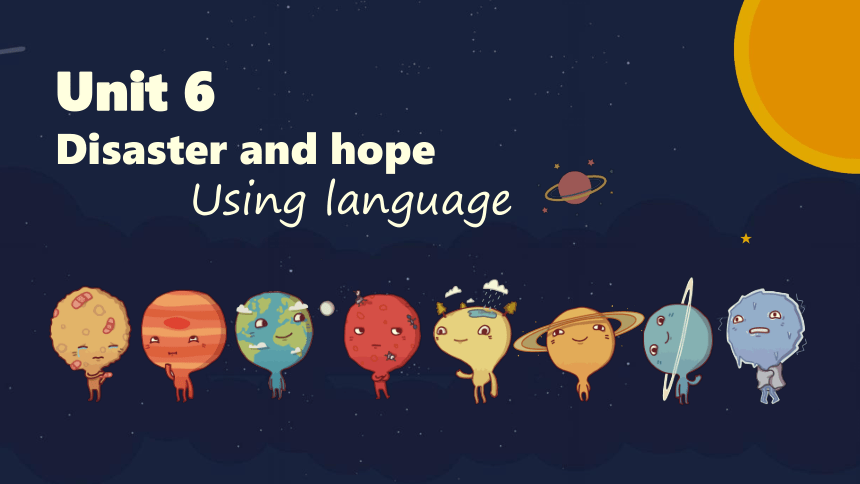 | |
| 格式 | pptx | ||
| 文件大小 | 3.7MB | ||
| 资源类型 | 教案 | ||
| 版本资源 | 外研版(2019) | ||
| 科目 | 英语 | ||
| 更新时间 | 2023-05-09 16:07:12 | ||
图片预览

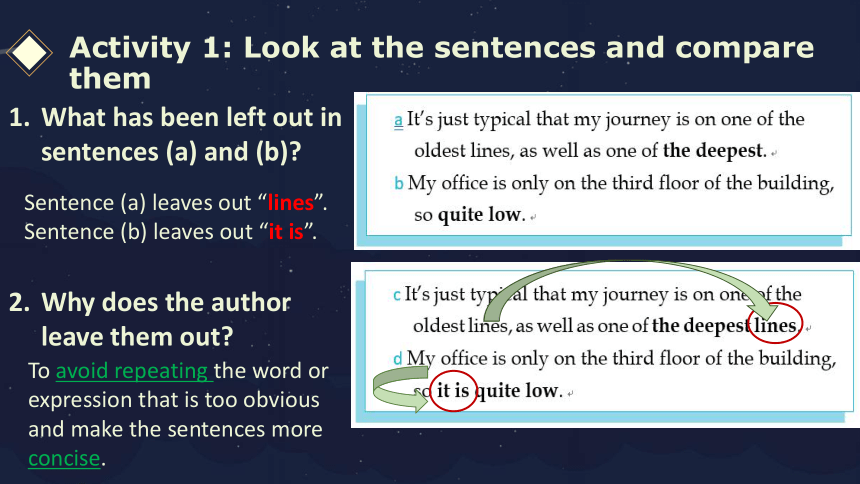
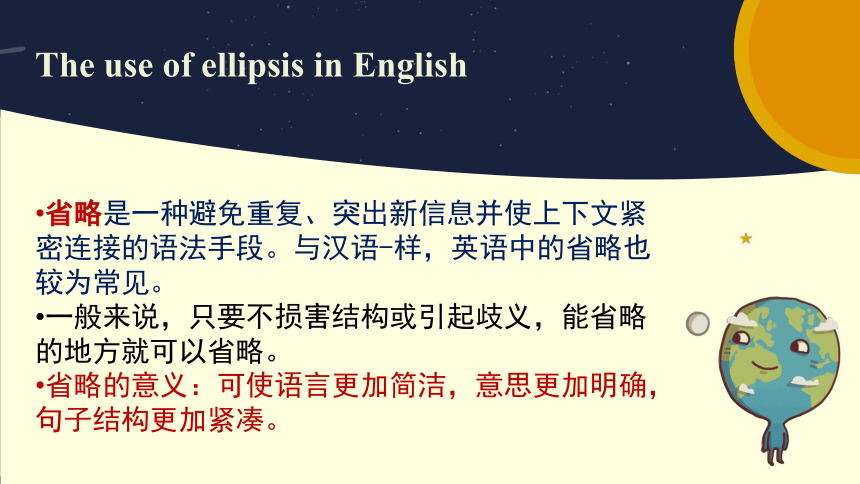
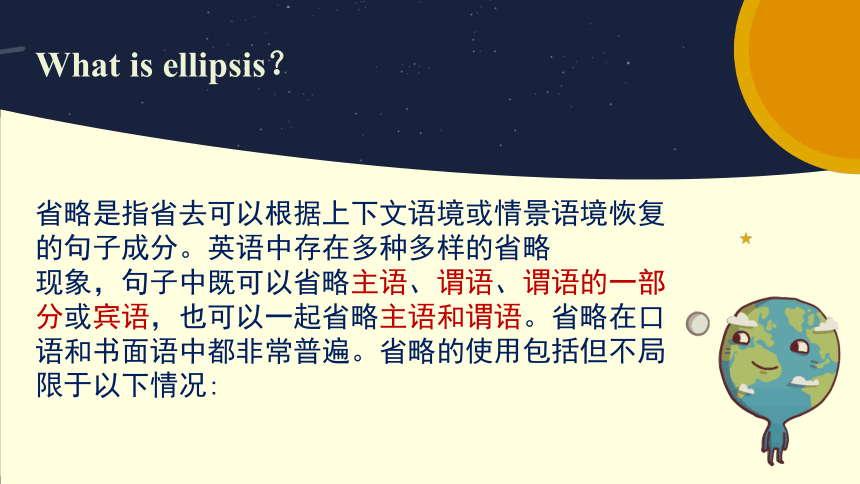
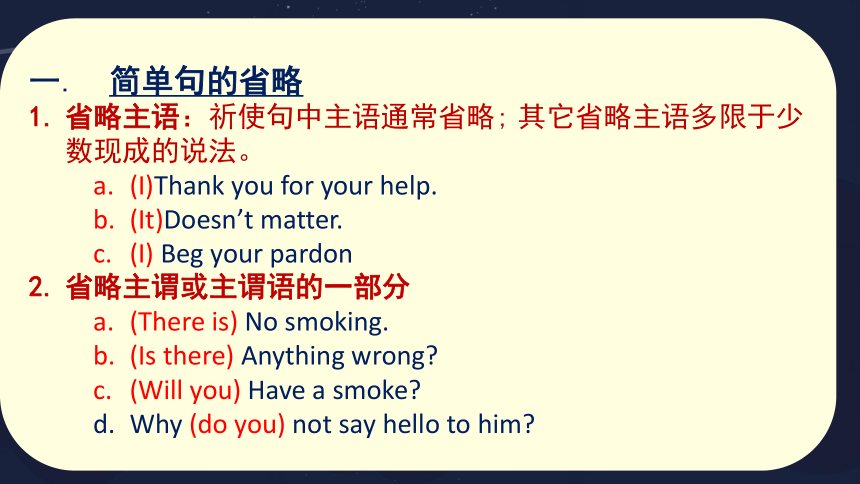
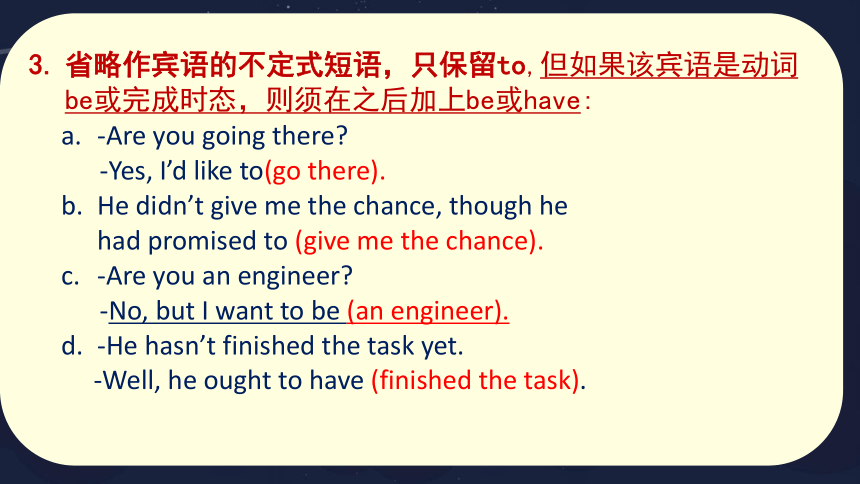
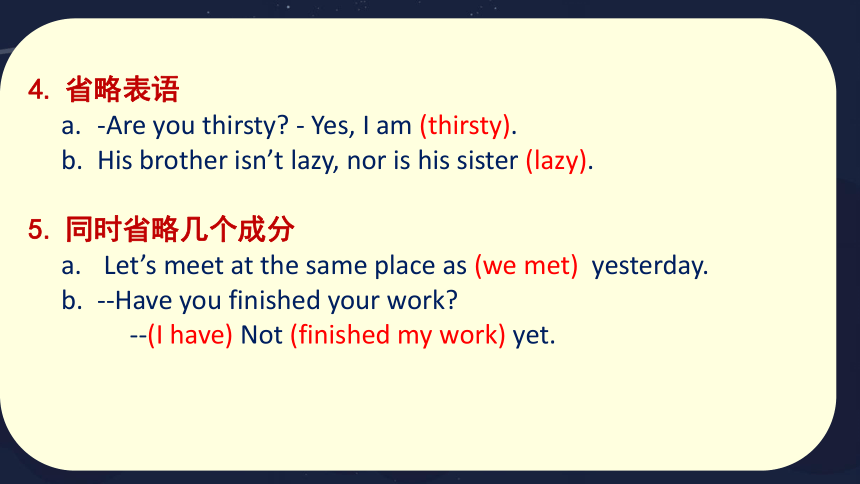
文档简介
(共18张PPT)
Unit 6
Disaster and hope
Using language
Activity 1: Look at the sentences and compare them
What has been left out in sentences (a) and (b)
Why does the author leave them out
Sentence (a) leaves out “lines”.
Sentence (b) leaves out “it is”.
To avoid repeating the word or expression that is too obvious and make the sentences more concise.
The use of ellipsis in English
省略是一种避免重复、突出新信息并使上下文紧密连接的语法手段。与汉语-样,英语中的省略也较为常见。
一般来说,只要不损害结构或引起歧义,能省略的地方就可以省略。
省略的意义:可使语言更加简洁,意思更加明确,句子结构更加紧凑。
What is ellipsis?
省略是指省去可以根据上下文语境或情景语境恢复的句子成分。英语中存在多种多样的省略
现象,句子中既可以省略主语、谓语、谓语的一部分或宾语,也可以一起省略主语和谓语。省略在口语和书面语中都非常普遍。省略的使用包括但不局限于以下情况:
一. 简单句的省略
省略主语:祈使句中主语通常省略; 其它省略主语多限于少数现成的说法。
(I)Thank you for your help.
(It)Doesn’t matter.
(I) Beg your pardon
省略主谓或主谓语的一部分
(There is) No smoking.
(Is there) Anything wrong
(Will you) Have a smoke
Why (do you) not say hello to him
省略作宾语的不定式短语,只保留to,但如果该宾语是动词be或完成时态,则须在之后加上be或have:
-Are you going there
-Yes, I’d like to(go there).
He didn’t give me the chance, though he had promised to (give me the chance).
-Are you an engineer
-No, but I want to be (an engineer).
-He hasn’t finished the task yet.
-Well, he ought to have (finished the task).
省略表语
-Are you thirsty - Yes, I am (thirsty).
His brother isn’t lazy, nor is his sister (lazy).
同时省略几个成分
Let’s meet at the same place as (we met) yesterday.
--Have you finished your work
--(I have) Not (finished my work) yet.
二. 主从复合句中的省略及其他情况的省略。
主句中有一些成分被省略
(I’m) Sorry to hear you are ill.
(It’s a)Pity that he missed such a good chance.
- Is he coming back tonight -I think so.
- She must be busy now
- If so, she can’t go with us.
- Is she felling better today
- I’m afraid not.
- Do you think he will attend the meeting
- I guess not.
情况 例句
并列句 She went to the clinic and (she) saw a doctor.
Sally will be arriving today and Ann (will be arriving) tomorrow.
John once smoked like a chimney, but he doesn’t (smoke) now.
表示比较 的从句 She looks older than my mother (does).
The weather isn’t as good as (it was) yesterday.
对话 (I’m) Sorry I couldn’t come.
(Pass me) The salt, please.
A: Are you coming B: Yes (I’m coming).
告示、标牌、报纸标题 (There will be) Road works ahead!
(A) Millionaire (was) poisoned (in his home) in Beverly Hills.
习惯用语 What if (=What will/would happen if)
World War III should happen
We need to solve the problem as soon as (it is) possible.
Why not (=Why don’t you) clean the room after breakfast
2 其他情况的省略
Activity 2
Find out what words have been removed before or after the underlined words.
its ways (to forecast the weather)
dry period (that’s on the way)
more loudly (than usual)
(look) for birds
when and where (something bad is going to happen)
Activity 3: Remove words from the news report to make it more concise
The 8.1 magnitude earthquake that hit Nepal on 25 April 2015, was one of the worst earthquakes in history. On hearing the news, China was quick to start organising emergency aid.
International rescue teams soon began to arrive in the country. Amongst all the international heavy rescue teams, the China International Search and Rescue Team(CISAR) was the first international heavy rescue team to arrive. Consisting of 62 people, it not only included rescuers and medical staff, but also included earthquake experts. By early May, emergency aid worth 9.7 million US dollars had been donated by China, with a further round of emergency aid to follow.
改写句子:使用省略手段避免下面各句重复与冗赘。
Someone has used my phone, but I don’t know who has used it.
John worked hard but his brother did not work hard.
I have lazy students and hardworking students in my class.
--- Has he ever been abroad --- No, he has never been abroad.
If it is necessary, we will finish it ahead of time.
Give me your name and address, please.
It is well done.
He could answer the questions very well if he would answer the questions but he didn’t answer the questions.
Extreme weather conditions
What do you know about weather forecasting
Activity 7: Listen & Match
Activity 8
warm clothes
-15
fry meat on the road
get medical attention
hurricane
safe indoors
13
through floodwaters
25
wildfires
Activity 9
Work in pairs. Act out the conversation to talk about an extreme weather condition.
Student A: Turn to Page 83.
Student B: Turn to Page 86.
Activity 10
Work in pairs. Choose another extreme weather condition and have a similar conversation.
Unit 6
Disaster and hope
Using language
Activity 1: Look at the sentences and compare them
What has been left out in sentences (a) and (b)
Why does the author leave them out
Sentence (a) leaves out “lines”.
Sentence (b) leaves out “it is”.
To avoid repeating the word or expression that is too obvious and make the sentences more concise.
The use of ellipsis in English
省略是一种避免重复、突出新信息并使上下文紧密连接的语法手段。与汉语-样,英语中的省略也较为常见。
一般来说,只要不损害结构或引起歧义,能省略的地方就可以省略。
省略的意义:可使语言更加简洁,意思更加明确,句子结构更加紧凑。
What is ellipsis?
省略是指省去可以根据上下文语境或情景语境恢复的句子成分。英语中存在多种多样的省略
现象,句子中既可以省略主语、谓语、谓语的一部分或宾语,也可以一起省略主语和谓语。省略在口语和书面语中都非常普遍。省略的使用包括但不局限于以下情况:
一. 简单句的省略
省略主语:祈使句中主语通常省略; 其它省略主语多限于少数现成的说法。
(I)Thank you for your help.
(It)Doesn’t matter.
(I) Beg your pardon
省略主谓或主谓语的一部分
(There is) No smoking.
(Is there) Anything wrong
(Will you) Have a smoke
Why (do you) not say hello to him
省略作宾语的不定式短语,只保留to,但如果该宾语是动词be或完成时态,则须在之后加上be或have:
-Are you going there
-Yes, I’d like to(go there).
He didn’t give me the chance, though he had promised to (give me the chance).
-Are you an engineer
-No, but I want to be (an engineer).
-He hasn’t finished the task yet.
-Well, he ought to have (finished the task).
省略表语
-Are you thirsty - Yes, I am (thirsty).
His brother isn’t lazy, nor is his sister (lazy).
同时省略几个成分
Let’s meet at the same place as (we met) yesterday.
--Have you finished your work
--(I have) Not (finished my work) yet.
二. 主从复合句中的省略及其他情况的省略。
主句中有一些成分被省略
(I’m) Sorry to hear you are ill.
(It’s a)Pity that he missed such a good chance.
- Is he coming back tonight -I think so.
- She must be busy now
- If so, she can’t go with us.
- Is she felling better today
- I’m afraid not.
- Do you think he will attend the meeting
- I guess not.
情况 例句
并列句 She went to the clinic and (she) saw a doctor.
Sally will be arriving today and Ann (will be arriving) tomorrow.
John once smoked like a chimney, but he doesn’t (smoke) now.
表示比较 的从句 She looks older than my mother (does).
The weather isn’t as good as (it was) yesterday.
对话 (I’m) Sorry I couldn’t come.
(Pass me) The salt, please.
A: Are you coming B: Yes (I’m coming).
告示、标牌、报纸标题 (There will be) Road works ahead!
(A) Millionaire (was) poisoned (in his home) in Beverly Hills.
习惯用语 What if (=What will/would happen if)
World War III should happen
We need to solve the problem as soon as (it is) possible.
Why not (=Why don’t you) clean the room after breakfast
2 其他情况的省略
Activity 2
Find out what words have been removed before or after the underlined words.
its ways (to forecast the weather)
dry period (that’s on the way)
more loudly (than usual)
(look) for birds
when and where (something bad is going to happen)
Activity 3: Remove words from the news report to make it more concise
The 8.1 magnitude earthquake that hit Nepal on 25 April 2015, was one of the worst earthquakes in history. On hearing the news, China was quick to start organising emergency aid.
International rescue teams soon began to arrive in the country. Amongst all the international heavy rescue teams, the China International Search and Rescue Team(CISAR) was the first international heavy rescue team to arrive. Consisting of 62 people, it not only included rescuers and medical staff, but also included earthquake experts. By early May, emergency aid worth 9.7 million US dollars had been donated by China, with a further round of emergency aid to follow.
改写句子:使用省略手段避免下面各句重复与冗赘。
Someone has used my phone, but I don’t know who has used it.
John worked hard but his brother did not work hard.
I have lazy students and hardworking students in my class.
--- Has he ever been abroad --- No, he has never been abroad.
If it is necessary, we will finish it ahead of time.
Give me your name and address, please.
It is well done.
He could answer the questions very well if he would answer the questions but he didn’t answer the questions.
Extreme weather conditions
What do you know about weather forecasting
Activity 7: Listen & Match
Activity 8
warm clothes
-15
fry meat on the road
get medical attention
hurricane
safe indoors
13
through floodwaters
25
wildfires
Activity 9
Work in pairs. Act out the conversation to talk about an extreme weather condition.
Student A: Turn to Page 83.
Student B: Turn to Page 86.
Activity 10
Work in pairs. Choose another extreme weather condition and have a similar conversation.
